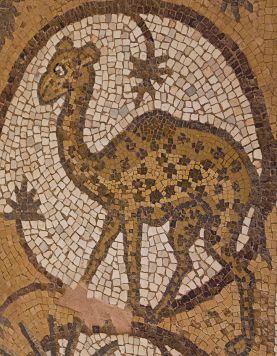322. Do the Math: Science in the Palaiologan Renaissance
Mathematics and the sciences in Byzantium, focusing on scholars of the Palaiologan period like Blemmydes and Metochites.
Themes:
• P. Bouras-Vallianatos, “Galen’s Reception in Byzantium: Symeon Seth and his Refutation of Galenic Theories on Human Physiology,” Greek, Roman, and Byzantine Studies 55 (2015), 431-69.
• B. Bydén, Theodore Metochites’ Stoicheiosis astronomike and the Study of Natural Philosophy and Mathematics in Early Palaiologan Byzantium (Göteborg: 2003).
• B. Bydén, “The Criticism of Aristotle in Nikephoros Gregoras’ Florentius,” in D. Searby et al. (eds), ΔΩΡΟΝ ΡΟΔΟΠΟΙΚΙΛΟΝ: Studies in Honour of Jan Olof Rosenqvist (Uppsala: 2012), 107-22.
• C.N. Constantinides, Higher Education in Byzantium in the Thirteenth and Early Fourteenth Centuries (1204-ca.1310) (Nicosia: 1982).
• E. Fryde, The Early Palaeologan Renaissance (1261–c. 1360) (Leiden 2000)
• P. Golitsis, “Georges Pachymère comme didascale. Essai pour une reconstitution de sa carrière et de son enseignement philosophique,” in Jahrbuch der Österreichischen Byzantinistik 58 (2008), 53-68.
• S. Kotzabassi (ed.), A Companion to the Intellectual Life of the Palaeologan Period (Leiden: 2023).
• S. Lazaris (ed.), A Companion to Byzantine Science (Leiden: 2020).
• I. Ševčenko, La vie intellectuelle et politique à Byzance sous les premieres Paléologues: Études sur la polémique entre Théodore Métochite et Nicéphore Choumnos (Brussels: 1962).







Comments
Philosophy and current political situation in Constantinople
Hi Peter,
Listening to your last podcast, I lost track of the historical Byzantine context. I wondered whether there is a connection between the topics or themes prevalent in 'philosophical thinking' at a certain period in Byzantine history and the main 'political' concerns in those days.
It seems to me that you do distinguish [maybe vaguely defined] periods in Byzantine history. My question is: have you found any connection between those periods and main philosophical topics/concerns in those days. For instance: were 'philosophers' engaging in current political controversies, or mainly looking back, or raising issues that were to become prominent in a next period?
In reply to Philosophy and current political situation in Constantinople by Sjoerd Van der…
Philosophy and politics
The best example of a philosopher who discusses politics is of course Psellos, who wrote about recent emperors in his historical works. In episodes 310 and 312 we also looked at a variety of authors who responded to political developments; but I can see why you might feel that it is all a bit of a blur because I haven't done, like, a whole episode just giving you a summary of Byzantine history though I tried to sketch it in the first episode. With this episode here we are in the Palaiologoan period which is after the reconquest of Constantinople from the Latins, and obviously that made this literature we are discussing possible especially since the scholars in question were often connected to court life. Does that help at all?
Metochites
I like this episode about Metochites and his student Gregoras. But I just would like to make three remarks.
1) The speeches of Metochites are now edited and can be found in a singular edition (De Gruyter). But they are not translated. You can just find the greek text. Maybe it could have been interesting to reflect about the role of rhetoric in Metochites writings. I think these speeches of Metochites show late byzantine rhetoric very very and in my opinion they are a masterpiece. But the role of rhetoric in Byzantium was already treated in one of the episodes of this series. And I know that this series is now finished as i read your comments. But honestly i think it would have been nice to compare Psellos and Metochites , as they are both excellent byzantine rhetoricans and philosophers.
2) It could also have been interesting to say something about the essays of Metochites . You can find them translated in the edition of the swedish scolar Karin Hult. The english translation is quite well in my opinion. Metochites is like Psellos a man of letters. This is something which he shares with Psellos.
3) Metochites wrote also poems , which show his poetic talent. This is something which he also shares with Psellos. There is an english translation of this poems and they are worth reading.
The thing is Metochites was not only a man of science, but also a man of literature so to say. So he was not just writing about natural philosophy.
I think that an episode about the role of poetry/literatur in Byzantium would have been a good thing. This is something which i miss in this Podcast series about Byzantine Philosophy.
In reply to Metochites by FriendofByzant…
Byzantine literature
Yes, I have been wondering about that too - there are the Byzantine romances and someone else left a comment suggesting I could have covered satires. You are right that Metochites could have been discussed back in the episode on rhetoric (episode 311). These are things I should think about adding for the book version. Thanks for the suggestions!
In reply to Byzantine literature by Peter Adamson
Byzantine literature and rhetoric
I think that these things should be added for the book version. A lot of byzantine philosophers deal with poetry and with rhetoric. Metochites and Psellos are good examples for that. They are cultivated men of letters or in others words: poets and rhetors. And Psellos is not the only byzantine thinker who practise rhetoric in his wrintings or write rhetorical speeches. It would be worth to add this things for the books version in my opinion! This is a lot of stuff which can still be reflected and threatened in the book version! It shows the richness of the byzantine culture.
Philosophy
I enjoyed the story of Nikepherous Choumnos. From about 14:30. He argues that air is wetter than water. According to the podcast, motivated by a desire to create a conceptual tidiness; matching up Aristotle's four elements with Aristotle's four basic qualities. As a part of this, he redefines wetness as something that is more fluid and less solid.
That reminded me of a couple of practices I've noticed in philosophy. Firstly, redefining words to mean something else, which allow people to hold onto to their ideas. Secondly, creating what seem like non-common-sensical answers to objections, to again, allow people to hold onto to their ideas.
A couple of examples.
First, Dan Dennett appears to redefine free will. (He may have also done this with consciousness too). With free will, he describes a "free will" that is entirely deterministic. Our choices and actions being a kind of skill, but still part of a long unbroken causal chain, making him I suppose a compatibilist, and describes this as the kind of free will worth having. I'm sympathetic to his position, nevertheless, most people understand something different by the phrase "free will".
As with Choumnos, the thinking behind it seems to be reasonable, but the choice of the words "wetness" and "free will" as labels for that thinking is contentious. In using the label "free will" it seems Dennett wants to hold onto all the attractive vernacular baggage that comes with that. But his actual definition of free will once set out, is at odds with that attractive vernacular baggage, because he also wants to hold onto a deterministic causal chain. Choumnos' redefinition of wetness isn't as grievous as Dennett's redefinition, because Choumnos' new definition isn't actually opposed to the everyday definition.
The following comes from a Guardian piece called "The clockwork Universe: is free will an illusion?" (Atlantis here is free will).
"[Sam]Harris has accused Dennett of approaching the topic as if he were telling someone bent on discovering the lost city of Atlantis that they ought to be satisfied with a trip to Sicily. After all, it meets some of the criteria: it’s an island in the sea, home to a civilisation with ancient roots. But the facts remain: Atlantis doesn’t exist.
Second, the fine tuning of the universe is where certain cosmological constants have particular values that allow the evolution of life. These values could have been anything, but appear fine tuned to allow for our existence. A theist could explain this by saying that God, or the Gods, designed things that way. A non-theist has a problem though. They could say that something in the laws of physics converges towards the fine tuned constants we see, we just don't know what that something is yet. The most popular answer currently is the multiverse. The idea that there are many, perhaps an infinite number of universes, all with different cosmological constants. We just happen to be in one of those universes that are fine tuned to allow for life.
On the face of it, many people might find this preposterous. An infinite number of other universe that we can't see! And can't empirically test for! A fantasy, non-common-sensical nonsense, motivated by the desire to hold onto a non-theistic worldview.
Myself though, I don't put much value in common sense. Why shouldn't there be an infinite number of universes? Common sense seems to be the received wisdom of the time. A social construction rather than a magical intuition into the truth of things. I'm sure plenty of people thought the world was flat at one time. (Though not navigators). Common sense might say the people at the bottom of a round Earth would fall off. One of the best examples of this I likely heard on your podcast: that some of the ancient Greeks, including the Stoics, believed that we think in our hearts. Almost unimaginable to me. It's just obvious common sense that I think in my head. But maybe in a different time and place I would believe something different.
Anyways, the story of Nikepherous Choumnos reminded me of these two practices. Neither of which is necessarily bad. And it gave me an opportunity to say thanks for the podcasts.
In reply to Philosophy by Full of hot wetness
Full of wet air
Yes, I'm sure you heard that heart example on the podcast because it is my favorite illustration of how what is "obvious" changes over time.
I sympathize with a lot of what you say here; one further analogy to make might be to modern day physical science, which for instance suggests that water is in fact a combination of hydrogen and oxygen. Clearly that is not "intuitive" or "obvious" in any sense: it's a revelation of the underlying nature or structure of a familiar substance. I would suggest understanding Choumnos' proposal in that sense: it is not so much telling you to forget what you think about water and air, and replace them with something else, as arguing that the underlying nature as revealed by scientific inquiry is something rather surprising. To put it another way he wouldn't necessarily tell us to start using the word "wet" differently, only that there is a deeper, more technical meaning of the term which refers to fluidity rather than, like, feeling moist.
In reply to Full of wet air by Peter Adamson
That's interesting. I take…
That's interesting. I take the point about understanding Choumnos as not wanting to replace the understanding of his time, but to refine it in saying that the underlying reality is something different.
I also hadn't thought of Choumnos as "arguing that the underlying nature as revealed by scientific inquiry is something rather surprising". Perhaps in keeping with my post, it depends on how we define "scientific inquiry". That seems to involve the rigourous, unbiased collection of data, the creation of provisional theories that best fit that data, then going through that process again and again to replicate results, test new theories, account for anomolies and so on. It sounded as though what Choumnos was involved in was a conceptual exercise rather than an empirical exercise. More philosophy than science. But as you will have read far more about him and his context to make the podcast, you would be a better judge than me. If what he was doing was more philosophy than science, more armchair than out in the field or in the lab, it seems to me you're being generous to him.
That said I would be willing to call Democritus the father of atomic theory. He too would have been more philosophical than scientific. I'm assuming he didn't have a particle collider to work with. So it may be I'm being unfair to Choumnos. Perhaps that's because Choumnos came up with a way of conceiving things that, unlike Democritus, today still seems outlandish.
In the podcast you spoke about theoretical postulates of Aristotle's elements being closer to modern chemistry than we might think. There is something to that. The Higgs-Boson began as a theoretical postulate. As did anti-matter through Paul Dirac. But so too did phlogiston and the aether. The science is less in conceiving theoretical postulates and more in empirically testing for those postulates. Our establishing the underlying nature of reality is less about "revelation" and more about probing, testing, examining and experimenting.
On common sense, based on what I know of quantum mechanics and things like the the fairly recent discovery that the universe is expanding faster and faster, my intuition is that I can have no expectations about what the underlying reality of nature might be. My personal common sense is to be open minded. As long as there is evidence or good reason for whatever is being suggested. There is no direct evidence for dark matter. But as a theoretical postulate it solves a lot of problems, which is good reason to provisionally accept it. That doesn't seem to be the case with Choumnos, whose problem, perhaps only problem, was the untidyness of Aristotle's four elements and four basic qualities.
In reply to That's interesting. I take… by Full of hot wetness
"science"
Ah, good point. When I said he was giving the underlying scientific explanation I meant "scientific" in his sense - i.e. Aristotelian science, which is empirical in a sense but not in the way that modern science is, like with the experimental method.
Add new comment